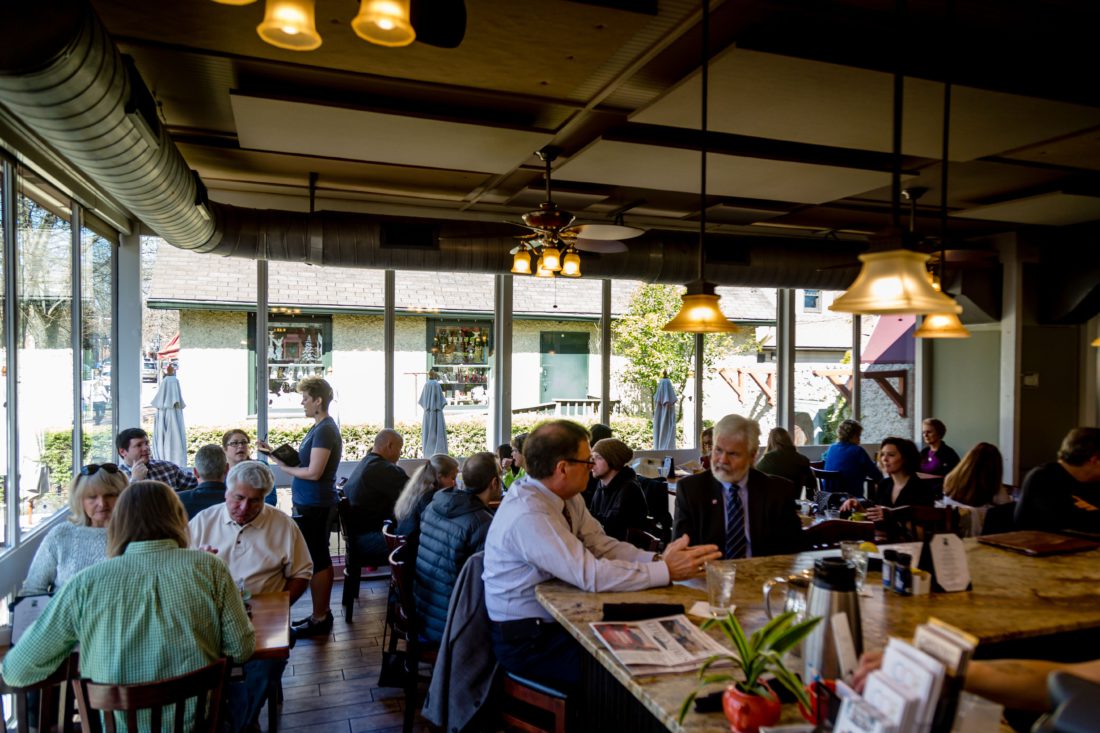Asheville’s busy restaurant scene may be best known for its hip decor, farm-to-table ingredients and carefully crafted cocktails, but when Hendersonville retiree Doris Galloway wants to meet friends or family for dinner, she has another top priority: a quiet ambiance.
Galloway, whose hearing in her right ear was impaired by a surgical procedure when she was a young adult, says the growing number of loud restaurants and other gathering places make socializing a challenge for her.
“There are times when I just don’t go into certain situations because I know that it’s hard to figure out what people are saying,” she explains. “If it’s a one-on-one conversation and there’s a lot of other noise, sometimes it’s just impossible.”
Galloway is not alone. A 2016 study by Consumer Reports found excessive noise levels to be the No. 1 complaint about restaurants, beating out such obvious contenders as poor service and even unsanitary conditions.
“You can’t eliminate the problem, for sure — it’s just a noisy situation, no matter what you do,” she concedes. “But it doesn’t make any sense to me when a restaurant or someone comes in and spends an enormous amount of time and financial resources and they don’t pay attention to that particular issue, which seems to be the case nowadays.”
It’s not just a question of simple frustration, says Christopher Hamilton, a doctor of audiology at The Hearing Center of Asheville. “For someone with hearing loss, or living with a hearing aid and maybe struggling in those situations, there could be associated effects like social isolation and depression,” he points out. Thus, loud environments may unintentionally exclude folks with hearing difficulties or extra sensitivity to noise. And in any case, continues Hamilton, “It also degrades the thing that eating out is meant to create: a shared social experience that rejuvenates, rather than harms, its participants.”

Physical impacts
Clearly, exposure to very loud sounds is associated with hearing damage and loss, says Bruce Ikelheimer, founder of the Asheville-based Acoustic Analytics. But even low-level background noise can have signifcant impacts, he notes, triggering anxiety or stress reactions.
“Long-term exposure to elevated levels of noise has been shown to have all kinds of serious health effects,” says Ikelheimer, who’s studied noise control for over 25 years. “It’s less direct than saying if you breathe asbestos you get lung cancer, and the connections are definitely less obvious, but elevated noise creates a physical response in the body, sort of a fight-or-flight thing, even at low levels.”
Hamilton, meanwhile, says that while most restaurant patrons probably aren’t at risk, it may be a different story for folks who work in those environments for eight or more hours at a stretch.
“The short answer is that in the majority of restaurants, the noise level isn’t going to be loud enough to damage your hearing,” he explains. “Maybe if it was a loud nightclub/bar type of situation — superloud for an extended period of time, maybe live music. If you look at the restaurant worker versus the patron, you’re probably more likely to run into an issue.”
Contemporary cacophonies
Restaurateur Kevin Westmoreland, an Asheville native who co-owns the Corner Kitchen in Biltmore Village and Chestnut downtown, says local eateries may not be intentionally turning up the volume. Many local restaurants and bars, he points out, are in repurposed warehouses or other older structures with high ceilings and a lot of hard surfaces, which amplify rather than dampen sounds.
And while fine dining used to come with carpeted floors, heavy drapery and tablecloths, “A lot of people are starting to use concrete bars, concrete floors — the sort of, I guess you could call it, minimalist or industrial decor,” says Westmoreland. “There’s a lot of that and a lot of glass. You combine glass and metal and concrete, you’re going to get noise.”
For Peter Pollay, executive chef at Posana, it’s one of a number of key factors to consider. “It’s not the first thing but it’s always, I’m going to say, the middle of your mind. You can always get carried away with the designs because it’s so exciting and it’s so much fun to put different colors together and different textures and types of finishings, but you always have to go back to how this is going to end up in the amount of noise that’s bouncing around the space.”
Simmer down
As awareness of the issue grows, however, some restaurant owners have begun fighting back. Both Pollay and Westmoreland say they’ve worked with acoustician Scott Varn to combat excessive noise and give guests a quieter dining experience. Varn owns the Asheville-based Harmony Interiors, a nearly 20-year-old company that specializes in reducing noise through a blend of interior design and custom-made, sound-deadening panels.
“The thing is, if you go into an environment that is sonically hostile, you will not go back. It doesn’t matter how much you like their food. I’m not saying it’s the most important thing, but it’s certainly a factor in the overall feel of the space,” Varn maintains. “Even Yelp now has a rating for noise level, and I absolutely get it.”
Restaurant owners, notes Varn — or, for that matter, anyone wishing to reduce noise in a building — can use decorative features such as drapes, rugs, tapestries and more to dampen loud spaces.
The challenge, says Westmoreland, is striking the right balance between creating a lively ambiance and providing a quiet, comfortable setting for guests of all hearing levels and sensitivities.
“If you put in too much sound deadening and you walk in the room, it’s like you walk into the library: You can hear everyone’s conversation, and you don’t want that,” he says.
The sound of silence
Still, even in a busy restaurant, notes Hamilton, there are steps you can take to enhance your chances of finding a quiet table — depending, of course, on the layout and the time of day.
“Basic recommendations would be not to sit with your back to a wall or hard surface,” he explains. “If you’re using hearing aids, or even if you’re not, sometimes it’s good to sit with whatever seems to be the noisiest part of the restaurant at your back. There’s some natural directionality to your ears and how your hearing works, and hearing aids, if they’re working properly, should be facing more toward the front.”
Hamilton also advises those with hearing difficulties or extra sensitivity to avoid peak activity times and ask restaurant staff to lower the volume of background music.
Despite everyone’s best efforts, however, says Pollay, the simple fact is that social spaces, including restaurants, do sometimes invite boisterous behavior.
“It’s not perfect all the time, and it does depend on who’s there, because you can get some yellers and some screamers and some celebrators, and that throws off the balance of noise. We try to control what we can, but there’s some things we can’t control. It’s a science, that’s for sure.”




Excellent subject for an article. Years ago, in a different city, I mentioned to our server that it was so loud that we couldn’t hear ourselves talk. She replied that the owner specifically designed the place to be that way because that’s the “vibe” that the owner wanted.
It would have been terrific to have some examples of local restaurants that try to keep the noise down.
“It would have been terrific to have some examples of local restaurants that try to keep the noise down.”
Agree that some examples of both acoustically friendly and sonically hostile restaurants would be useful. Can readers help?
The old Ambrozia in North Asheville had a high noise level that made dining unpleasant. Has the new Early Girl in that location fixed the problem?
Chesnut has a good sound ambience in my last experiences. Others?
A standby for the missus and I is Zambra. Always refreshingly relaxed.
I agree. Zambra is chill — lots of quiet in and the dark ambience supports a whisper.
Here are ones we find too loud to enjoy:
– Early Girl Eatery (Wall Street location)
– Avenue M
– Mela
– Luella’s BBQ (Merrimon Avenue location) on Friday/Saturday nights
Here is a list of some of the local restaurants that we have worked closely with to reduce the noise:
-Corner Kitchen
-Chestnut
-Nine Mile
-Limones
-Cornerstone (they even put up panels in the kitchen to protect the long term hearing of the kitchen and dish staff!)
-Ambrose West (music venue, not a restaurant, but gets a mention as a listening room)
Nice! I am a big fan of a sweet whisper and silence anywhere. One day I dread even the library may have overhead music.
Noise level is one of the major criteria we use to pick a restaurant! I find it aggravating to try and talk over the noise of other patrons in most restaurants. As the noise level goes up, everyone must talk louder to be heard across the table! A good meal out is supposed to be relaxing and enjoyable, not a contest to out shout everyone else! There are some very fine restaurants in Asheville that serve up fine food an unacceptable levels of noise. I will not be in them.
“The thing is, if you go into an environment that is sonically hostile, you will not go back. It doesn’t matter how much you like their food.”
This used to be true for me. But, these days, there doesn’t seem to be any quiet places remaining. So, I’ve taken to using foam earplugs. It does a great job of attenuating the overall volume and really shines by stopping the harsh high frequencies. The best few dollars I’ve ever spent. They’re also must-haves for airline travel, short of noise-cancelling headphones.
As much as loved their food, I quit going to Farm Burger due to the loud music.
“Sonically hostile”
Yet another Mountain X article detailing the disturbing frailty of so many of Henderson and Buncombe county residents.
Thankfully most are aging out of mainstream society.
of course, you, Johnny, are not aging at all, right? Harmony did a nice job on Ambrose West! Great local venue for medium size events.
For some, conversation is as important to a pleasant dining experience as food. This rules out many local restaurants. Kudos to Brooke Randle for an interesting article.
It is a sad sign of the times we live in… I remember lovely restaurants in Philly where you could truly “dine”… enjoying the food and ambiance. It was special and an enjoyable evening of food and conversation…soft conversation…
On top of the regular din, there are also restaurant/bars that have live music at weird times of the day when you’re really not expecting it or they play their music super loud. As someone who worked at a music venue and other loud places before, the one time I want peace and quiet is when I go eat with friends and just want to enjoy conversation. For some reason, even though they are often busy, I notice I can always hear really well at Corner Stone on Tunnel Road and also the Bull and Beggar seems quieter even when there’s lots of people there. Wasabi is also nice and quiet most of the time.
Why Is the World So Loud?
https://www.theatlantic.com/magazine/archive/2019/11/the-end-of-silence/598366/